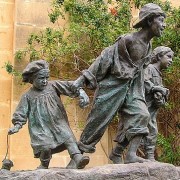|
Home
|
Dec 11, 2023
This week’s themeEponyms This week’s words Gavroche Bechdel test chimerize grangousier lexiphanic 
Les Gavroches, 1907
Sculpture: Antonio Sciortino Previous week’s theme Illustrated words A.Word.A.Day
with Anu GargThere’s one category of words I can never get enough of: eponyms, the name-dropping words. An eponym is a word coined after someone, from Greek epi- (upon) + -onym (name). It’s a tiny capsule of history that captures some defining attribute of a person, real or fictional. For an example from real life, consider Charles Boycott. Picture an English land agent in Ireland, always keen on collecting rent, poor harvest or not. His rent-collecting led to him being, well, boycotted. Tenant farmers and their workers refused to harvest crops; local shopkeepers would not serve him. Talk about your name sticking around for the wrong reasons! In fiction, Charles Dickens’s characters are so memorable that they’ve jumped out of the pages and into our vocab. The best known among them is Scrooge, the poster boy for penny-pinching! Talk about a character with lots of interest. This week we’ll feature five eponyms coined after people from the real world, literature, and mythology. Who in today’s world has that eponym-worthy spark? It could be your quirky neighbor, a celebrity, someone in your family, or even a historical figure making a comeback. Spill the beans on our website or email us at words@wordsmith.org. As always, include your location (city, state). Gavroche
PRONUNCIATION:
MEANING:
noun: A street urchin.
ETYMOLOGY:
After Gavroche, a boy in the 1862 novel Les Misérables by Victor Hugo.
Earliest documented use: 1876.
NOTES:
Gavroche’s parents abandon him and he is forced to live on the
streets of Paris where he adopts this name. The word gavroche embodies
more than just the physical state of living without a permanent home;
it also conveys a sense of resilience and resourcefulness, a spirit of
independence and audacity needed to survive in such circumstances.
USAGE:
“He knew the Gavroche who danced attendance on Mr. Quilp at his wharf.” Adolphus William Ward; Dickens; Harper; 1882. A THOUGHT FOR TODAY:
You only have power over people as long as you don't take everything away
from them. But when you've robbed a man of everything, he's no longer in
your power -- he's free again. -Alexander Solzhenitsyn, novelist, Nobel
laureate (11 Dec 1918-2008)
|
|
Subscriber Services
Awards | Stats | Links | Privacy Policy
Contribute | Advertise
Awards | Stats | Links | Privacy Policy
Contribute | Advertise
© 1994-2025 Wordsmith